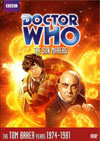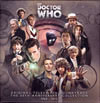The Sun Makers
 |
 |
 |
DVD NTSC
Region 1




|
DVD PAL
Region 2


|
VHS Video
NTSC


NTSC


PAL


|
|
(Doctor Who Story No. 95, starring Tom Baker)
- written by Robert Holmes
- directed by Pennant Roberts
- produced by Graham Williams
- music by Dudley Simpson
- 4 episodes @ 25 minutes each
|
Story: Six artificial suns help sustain
life on a colony on the planet Pluto, but its
citizens are being oppressed, and taxed, to
death. Can the Doctor, Leela, and K9 navigate the boiling
tensions of this society's domed industrial
Megropolis complexes, and free the colony from
the chains of usury?
|
|
DVD Extras include:
- Audio commentary by Tom Baker (The Doctor),
Louise Jameson (Leela),
Michael Keating (Goudry),
and director Pennant Roberts.
- "Running from the Taxman" retrospective making-of featurette (25 min.) with
Jameson, Keating, Roberts,
historian Dominic Sandbrook, and
astronomer Marek Kukula.
- "The Doctor's Composer - Part Two" featurette (18 min.) interviewing Dudley Simpson.
(See "The War Games" for Part One.)
- Photo Gallery music & sound effects montage (4 min.)
- Pop-up Production Note Subtitles
- Outtakes & bloopers (32 seconds)
- Story trailer (43 seconds)
In-Depth Analysis Review
by Martin Izsak
|
|
WARNING: This review contains "SPOILERS", and is intended for
those who have already seen the program. To avoid the spoilers,
read the Buyers' Guide version instead.
|
The Doctor finally gets to confront the most heinous and insidious
evil in the universe: Taxes!! Rich satire combines with an exciting,
triumphant action plot, producing the most enjoyable story of the season.
The most important ingredient in the success of this tale is by far
the writing. Robert Holmes proves eminently versatile as the horror style
he had preferred and helped develop gets the boot. As humour and sci-fi
fantasy take over, Holmes rolls right with it and spearheads its best
and most inspired showing this season.
His subject matter strikes a chord far louder than anything that
"Image of the Fendahl" (the previous story)
brought up earlier, encouraging the entire production
team to aid and embellish the details that make the story so worthwhile.
He also delivers a solid on-screen plot that keeps the Doctor, Leela, and
even the hastily added K9 busy confronting the characters and issues at
hand.
But best of all, he continues his tradition of creating wonderful
new characters to populate the screen. Gatherer Hade is typical Holmes,
the not-so-competent official high up in an organization, with too high
an opinion of himself and just begging for someone to come in and make
fun of him. The Collector is a much more unique creation, the symbolic
realization of taxation, usury, and corporate exploitation gone wild.
Actor Henry Woolf, given
superb make-up, costume, and mobothrone wheelchair prop, does supreme
justice to this key role. He and Richard Leech playing Gatherer Hade lead
a wonderful cast who all put in good performances that make the story work
well.
Also of note in the cast as Goudry is Michael Keating, who would go on
to play Vila, my favourite character in Terry Nation's sci-fi series
Blake's 7, and be the only actor to feature in
every single episode of that show. It is a great joy to see him playing
not too dissimilar a character in a poignant Doctor Who story as well.
As for the TARDIS, the superior interior continues to reign, while
the police box gets short-changed on materialization effects. At least
the interior/exterior relationship is defined reasonably enough.
The story is also a bit skimpy with grand-scale establishing shots,
lacking the kind of opening space panoramas that many other stories this
season were blessed with. A shot of Pluto from space, with six suns around
it would have been a great touch, as would have some good model work for the
Megropolis One city. The composite shot appearing on the TARDIS scanner
and again later as a cutaway view lacks a certain believability, as though
it would be an impossibility in three dimensions, and therefore must only
have two.
The opening sequence of the story is not too impressive either,
beginning with Cordo in an empty and completely white corridor set,
followed by an introduction
to Gatherer Hade's office that makes it look like a pile of oversized
children's building blocks assembled by someone trying to make an indoor
play fort or a sand-castle. This type of minimalist set design works as shot
throughout most of the story, when one can assume there are proper walls
in the darkness behind the highlighted bits in obvious sight, but the
entrance to Hade's office destroys the needed illusion from the beginning,
where it is all too obvious that there is no wall between one side of the
door and the other, and where the view from his desk can see into the
rib cage entrance hall from its outside, rendering it redundant. This
prompts the viewer to scrutinize the sets more closely than normal during the
rest of the story, which is not a good thing. Blank white corridors are also
not too riveting, but at least these match up with the long corridor
filmed on location. Perhaps it wasn't such a great location after all,
despite its impressive size.
In large part, the location material works really well for the story,
giving it a sense of scale and enough diversity to make the industrial
city society believable and selling many of the set-pieces that get mixed
in afterwards.
|
Pennant Roberts directs the action of the story clearly and adequately,
even if it sometimes lacks the punch and tension it might have been able
to achieve. The crew plays it safe with lasers. K9 gets a few good shots
in during the middle episodes, with similar sound and superimposed visual
beams as during his introduction in
"The Invisible Enemy" (story no. 93),
although here
it is much better directed and pulled off with greater finesse. The rest
of the weapons fire has to make do with flash charges. Not all that one
can hope for, but it works all right in the end, delivering better action
than that of "The Invisible Enemy."
The story really does become an enjoyable romp as the final episode
draws near. Holmes and co. take time to detail the glorious triumph of
the Doctor and the citizens over their oppressors, lacing the event with
humour and having fun with it, an infectious atmosphere that easily spreads
to the story's audience. It is a sharp contrast to many works written by
Malcolm Hulke, which tackle equally poignant social themes, but can't
manage to believably turn things around for the good guys in the end.
Holmes finally surpasses Hulke with thematic writing here, and turns in
his best thematic work for Doctor Who in this story.
|
|
A mammoth suite of music from
"The Sun Makers"
lasting (11:22) was released on:
 |
Audio CD -
Doctor Who:
The 50th Anniversary Collection
11-disc version (2014)
More info
|
|
Several years later, the entire original score of music from
"The Sun Makers"
(about 27 minutes duration) was released on:
 |
Audio CD -
Doctor Who:
The Sun Makers
More info
|
|
|
|










